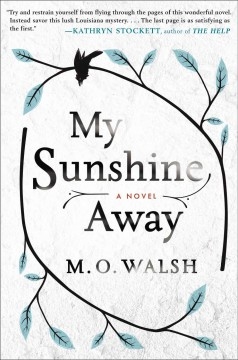Most of us who are over 20 can point to a few big events that set us on the road to adulthood. For the never-named narrator of M.O. Walsh’s debut novel, My Sunshine Away, it was the rape of his teen crush during her sophomore (his freshman) year of high school, Lindy Simpson. The narrator and Lindy have been neighbors since grade school, during which time he has harbored an innocent, but obsessive love for her. The search for the unseen rapist—who knocked her off her bike and forced her face into the ground—brings all the neighborhood oddballs into suspicion. It also brings the narrator closer to realizing his puppy-like fantasy. Unfortunately, he implicates himself in the process, in multiple ways. During this time, his divorced parents are still acting out their drama, and then his sister is killed in a car accident, leaving no adult—except a loveable but unstable uncle—with time or emotional bandwidth to spare for him as he lurches toward maturity.
 There’s no shortage of coming-of-age novels. Among the qualities that distinguish this one is the memoir-like voice of the narrator and the unsentimental, yet forgiving examination of his immature self and his teenage posturing. Now grown and settled, the narrator understands that his actions were at once classic teen behavior and almost invariably the “wrong” thing to do, yet they revealed the true nature of the people around him, progressively peeling away his naïveté.
There’s no shortage of coming-of-age novels. Among the qualities that distinguish this one is the memoir-like voice of the narrator and the unsentimental, yet forgiving examination of his immature self and his teenage posturing. Now grown and settled, the narrator understands that his actions were at once classic teen behavior and almost invariably the “wrong” thing to do, yet they revealed the true nature of the people around him, progressively peeling away his naïveté.
Another quality that lifts My Sunshine Away above the coming-of-age glut is the vivid setting; a white, middle-class subdivision of Baton Rouge, Louisiana in the late 1980s and early ’90s. The kids of Woodland Hills mostly go to the private Perkins School. I grew up in Hattiesburg, Mississippi, a morning’s drive from Baton Rouge. Walsh’s dead-on description of the brutal Louisiana summer stirred nostalgia and commiseration:
You should know:
Baton Rouge, Louisiana is a hot place.
Even the fall of night offers no comfort. There are no breezes sweeping off the dark servitudes and marshes, no cooling rain. Instead, the rain that falls here survives only to boil on the pavement, to steam up your glasses, to burden you.
The ninth chapter is a defense of the narrator and author’s native state that begins: “I believe Louisiana gets a bad rap.”
“We are relegated to a different human standard in the south as if all our current tragedies are somehow payback for our unfortunate past.”
Yes, the state is corrupt, its racial tensions endemic, its floods catastrophic. But there’s the food, the culture, the community. Red beans and rice or seafood po-boys are “small escapes from the blatantly burdensome land.”
This chapter of praise is wonderfully placed within the architecture of the book. Yes, it interrupts the narrative arc, but it also lightens the tone. Like the meals, this chapter offers a break from the bleak subject—a teenage girl’s rape; it doesn’t undo the awful, but it does give us, the readers, a reprieve. Chapter 28, a warm-hearted and evocative comparison of New Orleans and Baton Rouge, plays a similar role after a fraught and literally climactic chapter in which the narrator realizes that he never understood or even really empathized with Lindy’s trauma, so obsessed was he with his own wants.
Defying the literary tendency to define the South by its own history (this isn’t a story about race), Walsh ties the narrative to national events. The narrator traces his love of Lindy to the day of the Challenger explosion when he was in fifth grade. His school had assembled to watch the first teacher in space, only to witness a disaster. In the chaos, Lindy throws up on herself and he offers his shirt, a moment of vulnerability only witnessed by the teacher, his first protective act. And there’s our hero, the narrator, whose potential guilt comes up twice. The first time the police are questioning all young males in the neighborhood, he doesn’t even understand the term rape. He thinks it means to get totally beaten in a game, as in when LSU lost a football game 44 to 3, and someone says, “We got raped.”
The novel’s title comes from a line of the song, “You Are My Sunshine,” written by the late Louisiana governor Jimmie Davis: “Please don’t take my sunshine away.” While the chorus is pleasant and campy, the verses shift toward the sinister: I’ll always love you and make you happy / If you will only say the same / But if you leave me to love another, / You’ll regret it all one day.
The song shows the porous border between love and violence. A man thinks back on himself as a boy who has a crush on a girl and draws pornographic pictures of her. And he thinks about the man who assaulted her and wonders what kept the boy who had the crush and the white-hot yearnings from becoming the second man or someone like him? The clarity of age reveals all.


Comments are closed.